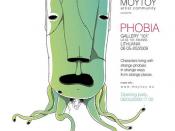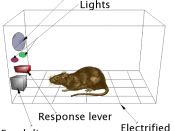RUNNING HEAD: PHOBIAS AND ADDICTIONS PAPER Page 6
Julie Jacobs
Psy/300
June 16, 2014
Phobias and Addictions Paper
According to Dictionary.com, "Phobias are an abnormal intense and irrational fear of a given situation, organism, or object" (2014). Phobias can interferes with a person abilities to work and socialize because of extreme fear. "Addictions are Habitual psychological and physiological dependence on a substance or practice beyond one's voluntary control" (Definition of Addiction). An addiction can also be strong enough to affect a person for being able to conducting a normal life. Both phobias and addiction are disorders that can be the result of conditioning. Behaviorist such as, Ivan Pavlov and B.F. Skinner, have studied two forms of conditioning: classical conditioning and operant conditioning.
Classical Conditioning was an accidental discovery made by Pavlov while studying dog's digestion process. He discovered there was a relationship between the dogs' salivated before they received their food and came up with a way to test his theory.
In classical conditioning, an organism learns to associate one stimulus with another. Development of phobias through classical conditioning takes place when one stimulus is paired with another that changes or obscures the original reflexive response to the original stimulus (Dingfelder, 2005). One example of a phobia developed through classical conditioning is the fear of needles or Aichmophobia. When a patient receives a shot, the needle is injected into the skin and causes pain, so the very sight of the needle induces fear. The patient has now been condition to fear needles and in some case the examination room where the shot has been administrated.
Skinner was known for experimenting with the control the environment had on our behavior know this is known as operant conditioning. Addiction occurs when behaviors is met with reinforcements. Reinforcement is...


